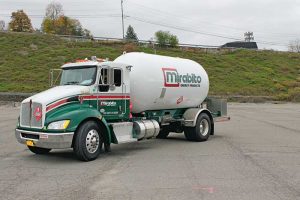Independent retailers seek to regain lost gallons through acquisitions
Davenport Energy CEO Lewis Wall Jr. noticed a fair amount of organic growth in the propane industry in the 1980s and 1990s. The residential market was booming and propane was affordable compared to other energy options.
Yet that growth stalled upon the turn of the millennium.
“Too many companies were doing the same thing in too many markets,” Wall says. “We felt the market would shrink, and we knew the growth of the 1990s had to slow down.”
Wall’s predictions proved to be fairly accurate, as propane prices spiked in the late 1990s. In addition, Davenport Energy lost a number of residential and commercial customers after a few big manufacturers in North Carolina and Virginia moved their businesses to Central America.
“That contributed to a lack of new homes being built that would have used propane,” Wall adds.
Despite losses in the residential market, Wall wanted to continue to grow Davenport Energy. With organic growth still hard to come by in the early 2000s, he looked to acquisitions as a way to supplant lost gallons. Since then, the company has acquired at least one to two companies almost every year.
More independent retailers like Davenport Energy have become buyers in the propane industry the past few years, sources say. Lack of organic growth tends to be the No. 1 factor driving independent retailers to become buyers, according to Gary Papay, founder and principal at The Oil & Gas Advisor.
Another noteworthy reason independent retailers are turning to acquisitions is lower propane prices today compared with prices of a decade ago. When prices were higher, fewer independent retailers had the working capital to handle an acquisition, says Steven Abbate, managing director at Cetane Associates. Today, prices have dropped, making it easier for smaller companies to strike a deal.
And it’s not just independent propane companies that are active in the market. In the Northeast, more heating oil dealers have sought to acquire propane companies as a way to supplant heating oil’s lost market share, Abbate adds.
“It’s said that about 200,000 heating oil accounts are converting away from heating oil each year,” he says. “While many of them are going to natural gas, many are also going to propane. So heating oil marketers are looking to enter the market, and the best way to do that is acquisition of a propane company. This has brought a whole new wave of buyers into the market.”
It’s uncertain exactly how many more buyers are in the propane industry today, but Papay and Abbate note that they have helped to assist more independent retailers on closing deals today than in the past.
“A lot of regional players seem to be in it for the long haul,” Papay says. “And I think we’ll see more coming in, not less. I think this will be good for sellers, as more competition for business makes this an attractive industry.”
The independent retailers stepping up as buyers all have their specific reasons to buy, such as lost gallons in the residential market, goals to diversify or hopes of expanding into new territories. Yet the overarching goal remains the same for all new buyers: growth.
LP Gas connected with a few independent retailers to learn why they became buyers in the propane industry.

Since launching business in 2004, Centergas Fuels has made nearly two dozen acquisitions of propane companies across Arkansas, Missouri, Oklahoma and Texas. Photo courtesy of Centergas Fuels.
Centergas Fuels Inc.
Amarillo, Texas
Larry Taylor performed more than 100 acquisitions in the convenience store industry throughout the 1980s and 1990s. Acquisitions served as a primary way for him to grow Taylor Food Mart, his convenience store chain.
“Acquisitions give you business from day one,” Taylor says. “You may have to improve that business or change it, but you have some new activity at least.”
Taylor decided to leave the convenience store industry for the propane industry in 2004 when he acquired Centergas II, a propane company in Amarillo, Texas. He saw an opportunity to expand and grow in the propane industry, so he sold his Taylor Food Mart chain to his CFO in 2008.
“Propane companies provided a decent margin that was a lot better than what we had in [convenience stores],” Taylor says. “I had done some propane business before and studied it a few years. I felt confident enough that it was a market worth getting into.”
Taylor launched Centergas Fuels Inc. not long after purchasing Centergas II and a couple of other small propane businesses in 2004 in West Texas. Since then, Taylor has looked to acquire smaller propane businesses and build equity in them as a means of growth. Centergas Fuels has made almost two dozen acquisitions across Texas, Arkansas, Missouri and Oklahoma since it opened.
“Bigger buyers in the industry might not look at the companies we’re buying because they have pretty low volumes,” he says. “But we might buy two to four of these companies in one area and merge them into one office. We feel like that strategy is probably the best way we can compete.”

Mirabito Energy Products looked to acquisitions to help it grow more in its upstate New York area. Photo courtesy of Mirabito Energy Products.
Mirabito Energy Products
Binghamton, New York
Mirabito Energy Products dabbled in mergers and acquisitions in the convenience store and heating oil industries years ago, but it wasn’t until about a decade ago that it wanted to acquire other propane companies.
“I’m a third-generation owner,” says Joe Mirabito, owner of Mirabito Energy Products. “The first generation wasn’t focused on acquisitions and neither was the second generation until late in his time. They didn’t have to acquire to grow because there was organic growth to be had.”
Yet when Mirabito stepped in as a third-generation owner, acquisitions were almost inevitable if he hoped to grow the business his family started.
“It became tough to grow in upstate New York, as the economy was struggling and the population was decreasing,” he adds.
Since stepping in as an owner in the early 2000s, Mirabito has performed nearly 40 acquisitions of propane, heating oil and convenience store businesses. To secure transactions, Mirabito Energy formed a small team on its staff to work on acquisitions.
“We all know what our responsibilities are and how we handle each situation with the seller,” Mirabito says.
Transitioning a newly acquired company is now one of Mirabito Energy’s strengths. The company uses its experience and educates the sellers through the process to make sure they are comfortable with terms of a deal.
“We understand that this might be the only transaction they’ve done, so we bring our experience to them regarding employees, licenses, customers and truck registrations,” Mirabito says. “I’ve learned early on that [acquisitions] come down to the people and making sure the buyer and seller are connected.”

Since Sail Energy launched business three years ago, it has grown its customer base to 20,000 heating oil and propane accounts through mergers and acquisitions of small companies. Photo courtesy of Sail Energy.
Sail Energy
Portsmouth, New Hampshire
Dennis O’Brien wasn’t new to the propane or fuel oil industries when he decided to become a private equity buyer in these industries a few years ago.
His father and grandfather had roots in the industries, and O’Brien even operated a small heating oil company in northern New Hampshire for a few years. He stepped out of the heating oil business to serve as a consultant from 2005 to 2012, though.
“During that time I stepped out, I was on the outside of the industry and realized there were some real opportunities in propane and fuel oil,” he says.
O’Brien developed a business plan and launched Sail Energy in 2014 as a private equity firm to purchase and grow retail operations. He aims to acquire “solid family companies” in New England. Since launching the business three years ago, Sail Energy has grown its customer base to 20,000 heating oil and propane accounts.
“There is no way we could have gotten that growth any other way besides acquisitions,” he says.
Acquisitions tend to be a personal matter for O’Brien, as he was once on the selling side of a deal. This helps him to empathize with sellers and understand what they might be feeling. To help sellers with transitions, O’Brien looks for strengths in the companies he acquires to see if he can adopt any of their practices.
“We just bought a business in Rhode Island that had a great process for maintaining and reconditioning vehicles every year,” O’Brien says. “That’s something we’ll adopt across our company moving forward. We look for ways to leverage their strengths in the transition.”
Talking acquisitions
Can you discuss how the mergers and acquisitions market has been for your company in recent years?
“I would say it’s grown in the last couple of years, and a few players have gotten more aggressive.”
– Brett Krause, executive vice president of corporate development at Energy Distribution Partners (EDP)
“I’ve seen an uptick in activity based on the fact that there are distressed sellers and businesses after a few warm winters that impacted them heavily, and there’s the fact that margins are normalizing. The warm winter of 2016 put some people in the scenario of needing to sell their business.”
– Eric Kruger, vice president of corporate strategy and propane acquisitions at Ferrellgas
“2016 was a pretty active year with lots of buyers at the table. I would call 2016 a seller’s market for sure. The MLPs and other top-sized companies were not quite as active, but there seemed to be quite a few [LP Gas‘] Top 50 climbers that are very active, ourselves included.”
– George Koloroutis, executive vice president and COO at ThompsonGas
How have the acquisitions you made this past year helped your business?
“These transactions all helped fill territory voids or helped us to expand outward from existing service areas.”
– Don Smith, director of mergers and acquisitions at MFA Oil Co.
“We had what I would consider a good year last year. We had a number of high-quality operators join the EDP family of companies. Finding acquisitions in the propane space isn’t like going to the grocery store and picking out whatever you want on the shelf. A number of things need to come together to match the needs of a buyer and seller. When good opportunities come up, we’re prepared to step up to the plate. That’s what transpired with all of the agreements we completed this last year.”
– Krause at EDP
What are some trends that you foresee affecting the propane industry in the next few years?
“The propane industry is still highly fragmented. There will still be opportunities for consolidations in the next few years. A primary driver for smaller independents to sell out is retirement, and that driver won’t be gone for a while. We expect a decent ramp-up in activity over the next two to three years.”
– Joshua Wolf, director at Cetane Associates
“We foresee further consolidation in the propane industry in the upcoming years. We also predict that pure-play propane acquisitions will become a rarity, especially in the Northeast as an increasing number of fuel oil marketers are adding propane to their portfolio.”
– Christina Armentano, director of business development at Paraco Gas
“I think you will continue to see an uptick in activity and continued consolidation. I’m seeing a lot of private equity businesses and others trying to roll up multiple propane businesses, which is leading to competition. I believe competition will only get fiercer with regard to buyers.”
– Kruger at Ferrellgas

















